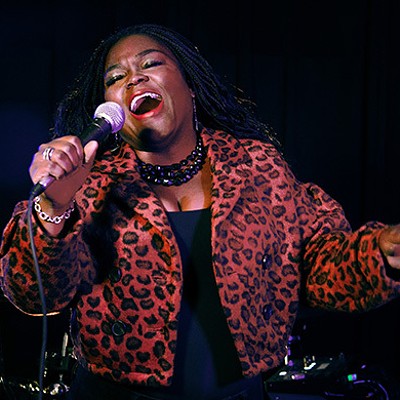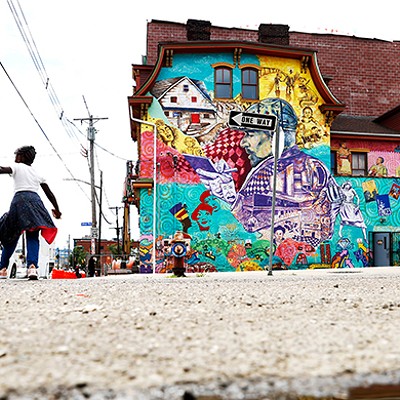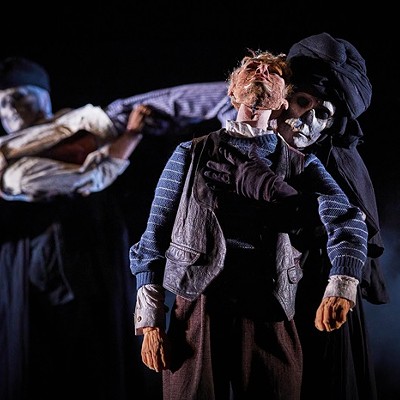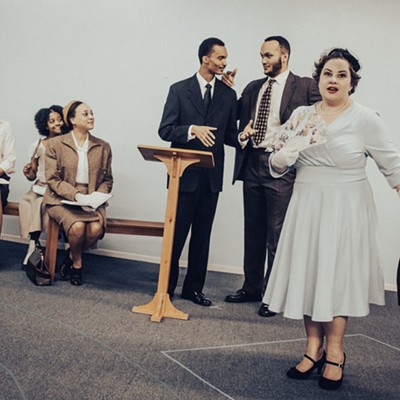A new production gives the August Wilson House back to Seven Guitars — and Wilson himself back to the Hill.
Pittsburgh Playwrights show ventures onto sacred theatrical ground
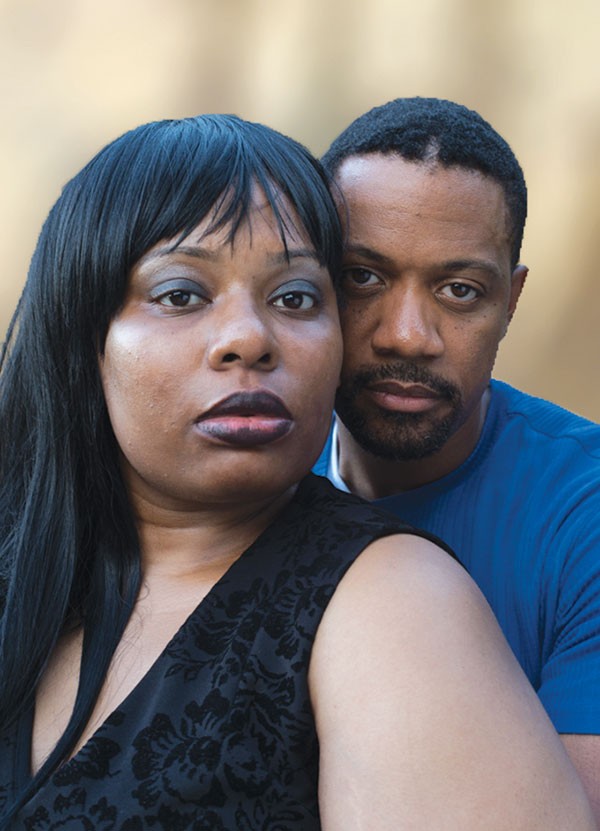
Photo courtesy of Gail Manker
PITTSBURGH PLAYWRIGHTS THEATRE presents SEVEN GUITARS
Aug. 5-28. August Wilson House, 1727 Bedford Ave., Hill District. $25-35. pghplaywrights.com
On July 27, shortly before dusk, Frank Hightower, a priest of Yemaja, the Yoruban deity of creativity, gathered in a circle the cast and crew of Pittsburgh Playwrights Theatre Co.’s new production of August Wilson’s Seven Guitars.
Playwrights has staged Seven Guitars before, but this time is special: The venue is the backyard of Wilson’s childhood home in the Hill District. It’s the very yard in which the play — which takes place in 1948 — is set.
This is already sacred theatrical ground. But prior to the show’s very first rehearsal here, Hightower (by day a photographer) poured water on the bare dirt and blessed the space further, in a traditional ceremony naming and honoring Wilson’s ancestors. Honorees included Wilson’s mother, Daisy, namesake of the Daisy Wilson Artist Community, Inc., the nonprofit that is restoring the long-vacant house as an arts center.
August Wilson, born in 1945, lived in the three-story red-brick house on Bedford Avenue until 1958. Seven Guitars is part of the late playwright’s famed cycle of plays, most set in the Hill, depicting African-American life in each decade of the 20th century. Seven Guitars hit Broadway in 1996 — just two years before Wilson met Mark Clayton Southers, the Pittsburgh-based actor and mill-worker who went on to found Playwrights and become a nationally recognized interpreter of his mentor’s work for the stage.
Southers, who birthed the idea to stage Seven Guitars at what’s called the August Wilson House, is directing. The lyrical, critically acclaimed ensemble piece for seven characters revolves around the murder of Floyd “Schoolboy” Barton, an aspiring bluesman recently sprung from prison. The show stars such Playwrights stalwarts and Wilson veterans as Wali Jamal, Kevin Brown, Jonathan Berry and Teri Bridgett.
“This is gonna be sweet,” said Paul A. Ellis, Wilson’s nephew and president of the Daisy Wilson Artist Community, whose restoration efforts on the building itself are well begun.
But just as the production will give the Wilson House back to Seven Guitars, so will it give Wilson himself — so long now on Broadway, and in Pittsburgh’s own Downtown theaters — back to the Hill. That became evident before rehearsal, when Southers introduced a next-door neighbor to the cast and crew. When Southers invited him to the show, the man joked, “I can see you all from my bedroom window!”
Playwrights has staged Seven Guitars before, but this time is special: The venue is the backyard of Wilson’s childhood home in the Hill District. It’s the very yard in which the play — which takes place in 1948 — is set.
This is already sacred theatrical ground. But prior to the show’s very first rehearsal here, Hightower (by day a photographer) poured water on the bare dirt and blessed the space further, in a traditional ceremony naming and honoring Wilson’s ancestors. Honorees included Wilson’s mother, Daisy, namesake of the Daisy Wilson Artist Community, Inc., the nonprofit that is restoring the long-vacant house as an arts center.
August Wilson, born in 1945, lived in the three-story red-brick house on Bedford Avenue until 1958. Seven Guitars is part of the late playwright’s famed cycle of plays, most set in the Hill, depicting African-American life in each decade of the 20th century. Seven Guitars hit Broadway in 1996 — just two years before Wilson met Mark Clayton Southers, the Pittsburgh-based actor and mill-worker who went on to found Playwrights and become a nationally recognized interpreter of his mentor’s work for the stage.
Southers, who birthed the idea to stage Seven Guitars at what’s called the August Wilson House, is directing. The lyrical, critically acclaimed ensemble piece for seven characters revolves around the murder of Floyd “Schoolboy” Barton, an aspiring bluesman recently sprung from prison. The show stars such Playwrights stalwarts and Wilson veterans as Wali Jamal, Kevin Brown, Jonathan Berry and Teri Bridgett.
“This is gonna be sweet,” said Paul A. Ellis, Wilson’s nephew and president of the Daisy Wilson Artist Community, whose restoration efforts on the building itself are well begun.
But just as the production will give the Wilson House back to Seven Guitars, so will it give Wilson himself — so long now on Broadway, and in Pittsburgh’s own Downtown theaters — back to the Hill. That became evident before rehearsal, when Southers introduced a next-door neighbor to the cast and crew. When Southers invited him to the show, the man joked, “I can see you all from my bedroom window!”




